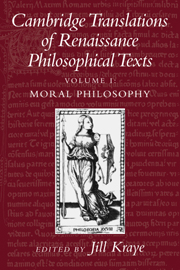Book contents
- Frontmatter
- Contents
- List of Translators
- Preface
- PART I CONCEPTS OF MAN
- PART II ARISTOTELIAN ETHICS AND THE SUPREME GOOD
- PART III ARISTOTELIAN ETHICS AND CHRISTIANITY
- PART IV PLATONIC ETHICS
- PART V STOIC ETHICS
- 16 Coluccio Salutati
- 17 Angelo Poliziano
- 18 Justus Lipsius
- 19 Francisco de Quevedo
- PART VI EPICUREAN ETHICS
- Bibliography of Renaissance Moral Philosophy Texts Available in English
- Index Nominum
- Index Rerum
19 - Francisco de Quevedo
Published online by Cambridge University Press: 05 June 2012
- Frontmatter
- Contents
- List of Translators
- Preface
- PART I CONCEPTS OF MAN
- PART II ARISTOTELIAN ETHICS AND THE SUPREME GOOD
- PART III ARISTOTELIAN ETHICS AND CHRISTIANITY
- PART IV PLATONIC ETHICS
- PART V STOIC ETHICS
- 16 Coluccio Salutati
- 17 Angelo Poliziano
- 18 Justus Lipsius
- 19 Francisco de Quevedo
- PART VI EPICUREAN ETHICS
- Bibliography of Renaissance Moral Philosophy Texts Available in English
- Index Nominum
- Index Rerum
Summary
Introduction
Don Francisco de Quevedo y Villegas (1580–1645) is chiefly known nowadays (as he was in his own time) for his picaresque novel The Petty Thief and his satirical Dreams. He deserves to be remembered, however, not only as a prolific poet and moralist, but also as an amateur translator and dilettante philosopher.
Stoic Doctrine – the title commonly given to the work translated here – first appeared in 1635 as part of a volume which contained Quevedo's translation of Epictetus and Phocylides into Spanish verse and his defence of Epicurus (see Chapter 23); the full title of the volume is Epicteto y Phocilides en español con consonantes, con el Origen de los estoicos, y su defensa contra Plutarco, y la Defensa de Epicuro, contra la común opinion. Epictetus's Enchiridion, with which this work starts, had been translated into Spanish twice before: by Francisco Sánchez in 1600 and by his successor in the chair of Greek and rhetoric at Salamanca, Gonzalo Correas, thirty years later. Although the Spanish speaking world of the Golden Age was thus well acquainted with the most comprehensive ancient text expounding Stoic moral philosophy, it was not until 1616, when Justus Lipsius's De constantia appeared in a Spanish translation (under the title Libro de la constancia), that readers without Latin were able to peruse a fully fledged introduction to Neostoicism. Surprisingly, the translation of Lipsius's treatise remained the only Spanish account of Neostoicism available for almost twenty years.
- Type
- Chapter
- Information
- Cambridge Translations of Renaissance Philosophical TextsMoral and Political Philosophy, pp. 210 - 226Publisher: Cambridge University PressPrint publication year: 1997



